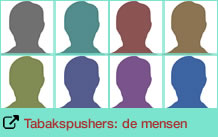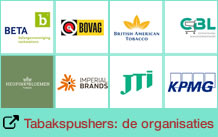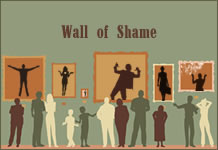Why the Netherlands scores so well on the Global Tobacco Index
17 November 2025
The Netherlands is at the top of the Tobacco Industry Interference Index of the Global Center for Good Governance in Tobaco Control. This is mainly due to the lawsuit that Youth Smoking Prevention filed against the Dutch state in 2014 about compliance with FCTC Article 5.3. Now, only parliament is still open to influence by the tobacco industry.
By the web editors
Highlights in this article:
- In 46 of the 90 countries, the influence of the tobacco industry has become stronger
- The Netherlands is doing best in Europe together with Finland
- A lawsuit by Youth Smoking Prevention resulted in the Dutch firewall against the tobacco industry in 2015
Worldwide, the tobacco industry is gaining more influence on tobacco policy. This is evident from the latest edition of the Global Tobacco Industry Interference Index by tobacco industry watchdog STOP in collaboration with the Global Center for Good Governance in Tobaco Control (GGTC). Of the 90 countries surveyed, 46 countries scored worse this year than two years ago. More than a third did better. The Netherlands finished together with Finland in fourth place in the global list and in first place out of 25 European countries.
The Global Tobacco Index is a biennial survey of the extent to which governments are implementing Article 5.3 of the World Health Organization’s (WHO) Framework Convention on Tobacco Control (FCTC). The index looks at how governments protect their public health policies against the commercial and vested interests of the tobacco industry, as prescribed in Article 5.3.
‘The industry is getting bolder’
The global ranking is led by Brunei Darussalam, Palau, Botswana, Finland, the Netherlands and Ethiopia with 35 or fewer points on a scale of 0 to 100. The industry has the most influence in the Dominican Republic, Switzerland, the US, Georgia and Japan with 86 or more points. New Zealand, the US, Cambodia, Nicaragua, France, and the Philippines declined the most compared to the 2023 list. The best developments ahead were made by Uruguay, the Maldives, Palau, Chile, Canada and Venezuela.
The fact that things are worse in half of the countries surveyed than before is a strong sign, says lead researcher Mary Assunta. “The industry is getting bolder and more brazen in interfering with public policy,” she says in a press release. “While some governments have stood up against blatant meddling, others have given in to industry arm twisting. If this is what is reported publicly, what is happening behind closed doors? Any lack of transparency in governments’ interactions with the industry offers a breeding ground for interference.”
Seven criteria
For the study, the researchers received information from civil society organizations in the various countries. In the Netherlands, this is the Trimbos Institute. Industry interference is assessed on seven points, from the degree of actual influence exerted on government policy and the extent to which governments participate in industry corporate social responsibility (CSR) projects, to the degree of transparency about contacts between public officials and the tobacco industry.
The overview shows how at least 10 countries postponed or did not implement excise duty increases under the influence of the tobacco industry. At least 20 countries are working with the tobacco industry through Memorandums of Understanding, training and enforcement actions to combat illegal trade. Members of Parliament, ministers and governors accepted invitations for tours of tobacco factories, with Philip Morris International’s factories in Switzerland being visited the most frequently. Only 14 of the 90 countries surveyed have a lobby register in which meetings with the tobacco industry are revealed. In 14 countries, parliamentarians stood up for the tobacco industry, which has delayed or watered down laws.
On the positive side, it was found that 20 countries have banned donations from the tobacco industry to political parties altogether. 32 countries have banned tobacco industry CSR projects, and 46 countries have resisted the tobacco industry’s harm reduction narrative and banned e-cigarettes and heated tobacco. 18 countries took steps to implement FCTC Article 5.3.
Youth Smoking Prevention Lawsuit about 5.3
The Netherlands leads the European list because it has been government policy here since 2016 that government officials must comply with FCTC Article 5.3. The Netherlands scores best of all 25 European countries in this respect. That position would never have come about without the lawsuit against the state that Youth Smoking Prevention filed in 2014 about compliance with Article 5.3. In the context of that case, it was shown that the tobacco industry had wide access to ministries at many levels.
In the case itself, it turned out that Youth Smoking Prevention (RPJ) could ultimately not invoke the FCTC, because only countries as parties to that treaty can hold each other accountable for compliance. But even before there was a verdict, then State Secretary for Health, Welfare and Sport (VWS) Martin van Rijn (PvdA) saw that RPJ was right. He sent a letter to all civil servants, clarifying how they should deal with the tobacco industry, and later had this laid down in a Protocol on how to deal with the tobacco industry. Since then, the entire government has kept the tobacco industry at bay.
Parliament remains weak spot
Yet the situation in the Netherlands is still far from ideal. The fact that the Netherlands does not score 0 on the Interference Index is partly due to the fact that the flavour ban for e-cigarettes has been postponed twice, there are generous rules for the import of duty-free tobacco and the age limit for the import of duty-free tobacco is 17 instead of 18 years. There is also still unnecessary interaction with the tobacco industry under the Memorandum of Understanding with Customs. And last but not least, the House of Representatives decided in 2021 that Article 5.3 cannot be prescribed to parliament as a whole, but that MPs must make their own assessments.
In December 2024, during the discussion of the citizens’ initiative Nicotinee, we were able to see where this can lead, when it turned out that the leader of the trade association of tobacco manufacturers VSK was texting extreme right-wing party PVV’s spokesman Patrick Crijns from the public gallery. Furthermore, the switch in spring 2024 of former health ministry spokesperson and liberal party VVD politician Ole Heil to Philip Morris International gives little confidence in a firewall between that company and the VVD.
That the Transparency Register of parliament according to the Interference Index mentions no tobacco lobbyists, can meanwhile be questioned. In that register, the PR agency De Issuemakers from Amstelveen is mentioned as representing ‘Various clients in the profit and non-profit sector’. This agency became part of the European PR agency Rud Pedersen in 2024, which according to LobbyFacts at least in Brussels also works for Philip Morris.
The idea that parliament would not fall under the rules of FCTC Article 5.3 is bizarre, because laws and regulations are precisely decided in parliament. At the very least, parties in the House could speak out explicitly about their dealings with the tobacco industry.
Do you want to stay informed of all the news from TabakNee? Then sign up for our monthly newsletter in English.
tags: Tobacco Industry Interference Index | FCTC | GGTC | Youth Smoking Prevention | WHO | tobacco lobby









 Stichting Rookpreventie Jeugd is geregistreerd als Algemeen Nut Beogende Instelling (RSIN: 820635315 | KvK: 34333760).
Stichting Rookpreventie Jeugd is geregistreerd als Algemeen Nut Beogende Instelling (RSIN: 820635315 | KvK: 34333760).